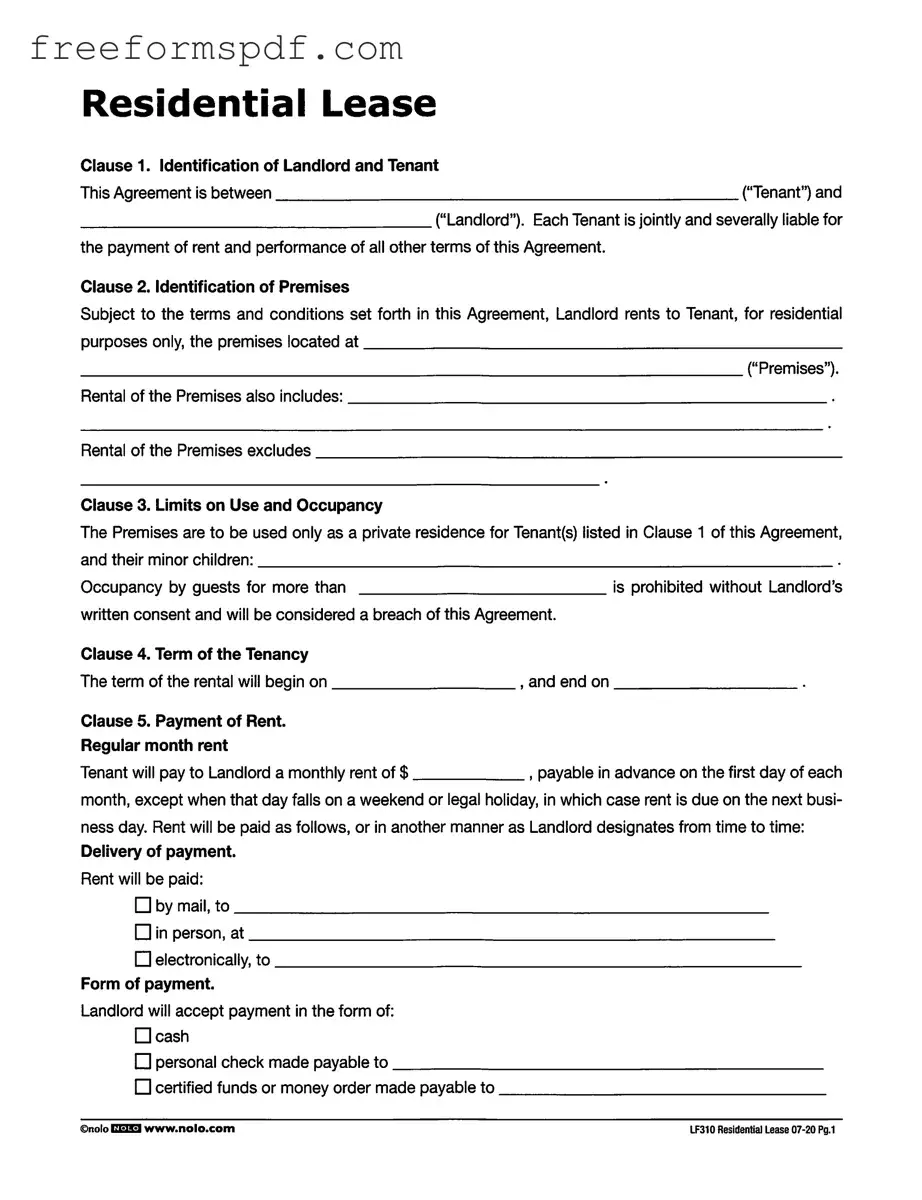Fill in a Valid Lf310 Residential Lease Template
Common mistakes
-
Incomplete Identification of Parties: Failing to fill in the names of the Tenant and Landlord in Clause 1 can lead to confusion about who is responsible for the lease. Ensure that both parties are clearly identified.
-
Incorrect Premises Information: Not specifying the correct address of the Premises in Clause 2 can create issues regarding the rental agreement. Double-check that the address is accurate and complete.
-
Missing Payment Details: Omitting the agreed-upon rent amount and payment method in Clause 5 can result in disputes later on. Clearly state the monthly rent, payment method, and any late fees to avoid misunderstandings.
-
Ignoring Utility Responsibilities: Failing to clarify which utilities are to be paid by the Tenant and which are covered by the Landlord in Clause 9 can lead to unexpected expenses. Be specific about utility responsibilities to prevent confusion.
Learn More on This Form
-
What is the purpose of the LF310 Residential Lease form?
The LF310 Residential Lease form is designed to outline the terms and conditions of a rental agreement between a landlord and a tenant. It specifies the responsibilities of both parties, including payment of rent, use of the premises, and other important details that govern the tenancy. This form helps protect the rights of both the landlord and the tenant by clearly stating expectations and obligations.
-
Who is considered a tenant under this lease?
A tenant is defined as any individual or individuals who are named in the lease agreement. Each tenant listed is jointly and severally liable for fulfilling all terms of the lease, including the payment of rent. This means that if one tenant fails to pay their share, the other tenants are responsible for covering the entire amount.
-
What are the rules regarding the use of the premises?
The premises rented under this agreement are intended solely for residential purposes. Only the tenants listed in the lease and their minor children are permitted to occupy the premises. Any guests staying for an extended period without the landlord's written consent may be considered a breach of the lease.
-
How is rent payment structured?
Rent is due monthly on the first day of each month, unless that day falls on a weekend or legal holiday. In such cases, rent is due on the next business day. Tenants must pay rent in the manner designated by the landlord, which may include options such as cash, personal checks, or electronic payments. Additionally, tenants are required to pay a prorated amount for the first month’s rent upon signing the lease.
-
What happens if rent is paid late?
If rent is not paid in full within a specified number of days after its due date, a late charge will apply. The lease agreement outlines the amount of the late fee and any additional daily charges for continued non-payment. It's important to note that the landlord retains the right to demand full payment of rent on the due date, regardless of any late charges.
-
Are there any restrictions on subletting the premises?
Yes, tenants are prohibited from subletting any part of the premises or assigning the lease without the prior written consent of the landlord. This restriction includes renting out the premises for short-term stays or vacation rentals. Violating this clause can lead to termination of the tenancy.
Misconceptions
Misconceptions about the LF310 Residential Lease form can lead to confusion for both tenants and landlords. Here are four common misconceptions:
- Misconception 1: All tenants are equally responsible for rent payments.
- Misconception 2: Guests can stay indefinitely without consequences.
- Misconception 3: Late fees are negotiable after they are incurred.
- Misconception 4: The security deposit can be used for last month’s rent.
This is true; however, many tenants mistakenly believe that only the primary tenant is liable. In reality, all tenants listed are jointly and severally liable. This means that if one tenant fails to pay, the others must cover the shortfall.
Many tenants think they can host guests for as long as they want. However, the lease specifies that occupancy by guests for more than a certain period requires written consent from the landlord. Failing to obtain this consent can result in a breach of the agreement.
Some tenants believe they can negotiate late fees once they are charged. The lease clearly states the late charge amount and conditions. These terms are set in advance and cannot be changed retroactively.
Tenants often think they can apply their security deposit to cover the last month’s rent. This is not allowed without prior written consent from the landlord. The deposit is meant to cover damages or unpaid rent, not as a substitute for regular payments.
Browse More Forms
Abn Form Medicare - This notice helps patients understand their Medicare rights and obligations.
Well Agreement - Clarifies that no other persons may draw water from the shared well without consent.
When engaging in the sale of a trailer, it is essential to utilize the New York Trailer Bill of Sale form to facilitate a smooth transaction. This form not only serves as a record of the sale but also protects the interests of both the seller and the buyer by clearly documenting the details of the transaction. For those seeking a reliable template to complete this process, you can find one at newyorkform.com/free-trailer-bill-of-sale-template/, ensuring your sale meets all legal requirements for registration and title transfer in New York.
What Color Is Miscarriage Blood - This form is designed for physicians to confirm a miscarriage for their patients.
